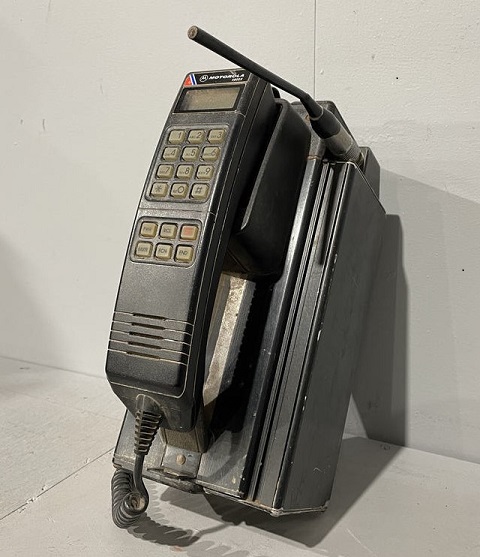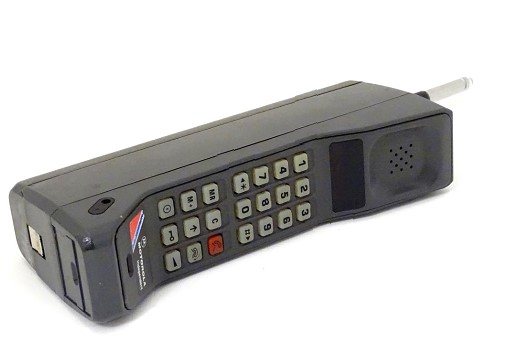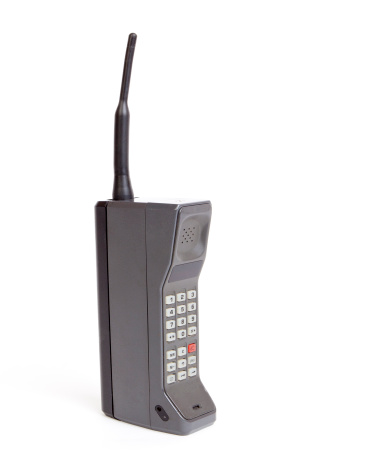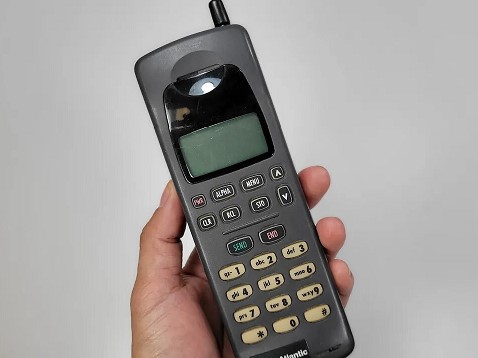It looks like you're using an Ad Blocker.
Please white-list or disable AboveTopSecret.com in your ad-blocking tool.
Thank you.
Some features of ATS will be disabled while you continue to use an ad-blocker.
share:
A little relevant history...
In 1992, for about two years, I sold cellular phones. I worked for United States Cellular who, at the time, was one of the larger carriers.
For anyone who might remember, cellular phones were permanently installed in your automobile then. The car battery powered the phone. Some phones could be detached and placed into a "bag" for portability. The bag was a leather pouch which contained a battery and antenna (bag phone).
While employed there, I had a phone installed in my car. This is kind of what it looked like..

As a fun reminder, after about six months in, a true mobile phone, made by Motorola, was introduced to us. This is what it looked like...

This is what it looked like with the extended-life battery....

I don't remember all the costs of the wireless plans, but I believe our largest plan included 1000 minutes for a monthly fee of $250. Anything over your pre-paid minutes cost you $.99 a minute. One second over a minute, cost you the full $.99. Needless say, talking minutes were the golden eggs of early cellular.... especially the roaming minutes.
Every companies' biggest selling point was it's coverage area. The more towers your company owned, the larger your potential coverage area. Each company built their own towers, and they had to obtain all necessary licensing for their territory. No single company had enough towers or territory to offer coverage across the full United States. They fought for territory, and a company couldn't put their towers in another's territory.
If a customer used another company's towers while making a call, they got a roaming charge of about $2 to $4 a minute. In answer to this, some companies made deals with other companies to use their towers, this enabled them to offer an expanded area or reduced roaming fees. If minutes were the golden eggs, towers were the geese that laid them.
As a customer, you could always turn roaming off and therefore be unable to connect to a tower that would charge roaming fees. This would result in a dropped call as you moved off your home towers. Some companies' areas were so small, that just leaving the city limits might cause you to roam and incur unwanted fees if you didn't hang up in time; or it could cause a constant dropping of calls on the edges of the city. Remember, even one second got the full minute charge.
Towers and minutes; the two most valuable things in the early cellular days.
So, what does all this have to do with not using your phone on airplanes?
I had a conversation with the branch manager in his office one day. He informed me that the reason you weren't allowed to use your phone on airplanes was because, "the planes move through the air too fast." As a result, the phone's signal moved too swiftly to track as it bounced from tower to tower. They couldn't accurately charge the necessary roaming fees. Primarily, the use of your phone on an airplane allowed you to "steal" free minutes. In the end, this would mean a significant loss of revenue.
So they struck a deal with the FAA, the FCC, and the airlines.* Together, they agreed to ban the use of cellular phones under the guise of radio interference. It's true; it's a lie. One created to help the cellular companies' bottom lines.
The technology was new at that time, and the average consumer didn't know enough about it to challenge the narrative. I guess when deciding how to phrase the ban, they figured the "greedy corporate interests ban" wasn't going to be very popular. So, they went with the "electronic interference ban." Eventually, as more new technology was developed, the ban expanded to "all electronic devices." It seems some lies are too good to give up. Airlines also saw it as a way to monopolize on and monetize all communications in and out of the plane; anyone remember phones installed on airplanes?
Now that the standard cellular service includes unlimited plans, satellites, and shared towers, the initial rationale for the ban is irrelevant. Yet the ruse continues to this day. I don't know why. Maybe they don't want to admit that they lied. Perhaps it could expose them to potential lawsuits. It could be that the lie still generates some sort of revenue. Who can say?
Regardless of why it still persists, the next time you're in an airplane and you are asked to turn your device off, think of slow towers and fast planes.
*I do not know which entities were involved in making the decision. It was nationally implemented, and later internationally.
edit on
8/13/2024 by Dapaga because: cliche'
My best half retired from a communications company, so we always had the luxury of taking a bag phone AND a stallite phone camping with us.
Cell service is really spotty in much of Idaho, so we were very grateful to have had other options when we broke down one time.
Cell service is really spotty in much of Idaho, so we were very grateful to have had other options when we broke down one time.
a reply to: Dapaga
Yeah I figured this out digging into 9/11. Pretty sure the explanation or what the government says is that they either were using airfone not cellphone and reports of cell phone calls were just wrong OR they were low enough to connect to the cell towers. I dont buy that. Either thing.
Yeah I figured this out digging into 9/11. Pretty sure the explanation or what the government says is that they either were using airfone not cellphone and reports of cell phone calls were just wrong OR they were low enough to connect to the cell towers. I dont buy that. Either thing.
a reply to: Dapaga
How many people do you believe actually put their communication device in "airplane mode" when to?
I suspect the advisory is very much a sacred cow with little to no evidence support the practice.
If there was truly any concern for navigation or other interference, I suspect the FAs would police it more thoroughly.
Given I'm likely not the only one to not heed the the "airplane mode" warning, when is the last time anyone's heard of a cell phone related airline mishap or complication?
Like so much govt oversight, I think it's just something that may have been pertinent at time of implementation and just allowed to persist, because allowing it to persist is less work than updating policy. Path of least resistance.
How many people do you believe actually put their communication device in "airplane mode" when to?
I suspect the advisory is very much a sacred cow with little to no evidence support the practice.
If there was truly any concern for navigation or other interference, I suspect the FAs would police it more thoroughly.
Given I'm likely not the only one to not heed the the "airplane mode" warning, when is the last time anyone's heard of a cell phone related airline mishap or complication?
Like so much govt oversight, I think it's just something that may have been pertinent at time of implementation and just allowed to persist, because allowing it to persist is less work than updating policy. Path of least resistance.
a reply to: Dapaga
When those Motorola phones you have pictured first came out they were over $ 3k on this side of the pond in the mid to late 80s and had a battery life of minutes and we jokingly called them action man phones they were so big and bloody useless .
I can remember the billing scam and fear of using them and have owned all the phones in your pictures at one time and still have a massive packing box in my attic full of these old phones which are rocketing in value for some reason .
I always laughed at the alleged call from the plane on 9-11 , It is still hard to get a reception in some areas where I stay even with 5G . or any G they came out with to this day , Dead zones in the landscape are a thing for some reason and no matter what phone or carrier you have you get almost no reception even for a text message , I have walked around jobs I have been on on construction sites with trays full of phones all on different networks and zero bars yet go 100 feet away and you will get a signal the broadband is exactly the same in these areas my 3G wifi dongal would not operate or was so slow it made dial up modems seem fast at downloading a picture and when I got broadband installed I was getting a whopping 0.8 mbps my friend still stays in that area and the signal or lack of is still a thing , yet they could phone from the moon in 1969 without a call getting dropped . .
Good luck back then trying to cancel a policy for lack of coverage or if you lost or broke your phone and the below video will bring back memories for many
m.youtube.com...
When those Motorola phones you have pictured first came out they were over $ 3k on this side of the pond in the mid to late 80s and had a battery life of minutes and we jokingly called them action man phones they were so big and bloody useless .
I can remember the billing scam and fear of using them and have owned all the phones in your pictures at one time and still have a massive packing box in my attic full of these old phones which are rocketing in value for some reason .
I always laughed at the alleged call from the plane on 9-11 , It is still hard to get a reception in some areas where I stay even with 5G . or any G they came out with to this day , Dead zones in the landscape are a thing for some reason and no matter what phone or carrier you have you get almost no reception even for a text message , I have walked around jobs I have been on on construction sites with trays full of phones all on different networks and zero bars yet go 100 feet away and you will get a signal the broadband is exactly the same in these areas my 3G wifi dongal would not operate or was so slow it made dial up modems seem fast at downloading a picture and when I got broadband installed I was getting a whopping 0.8 mbps my friend still stays in that area and the signal or lack of is still a thing , yet they could phone from the moon in 1969 without a call getting dropped . .
Good luck back then trying to cancel a policy for lack of coverage or if you lost or broke your phone and the below video will bring back memories for many
m.youtube.com...
When I see those giant cell phones I think of Saved by the Bell.
Veru interesting.
Not surprising in the least.
Thank you for sharing this with all of us.
I too worked with cell phones, but the modern era.
The very first android up to 2013, I got to test all androids going to the market.
HTC made the first one, then Samsung quickly joined the game as a high-end deliverable.
The rest is history.
It was fun. I got paid to play with the phones, write automated tests, and form people to perform my manual tests.
Not surprising in the least.
Thank you for sharing this with all of us.
I too worked with cell phones, but the modern era.
The very first android up to 2013, I got to test all androids going to the market.
HTC made the first one, then Samsung quickly joined the game as a high-end deliverable.
The rest is history.
It was fun. I got paid to play with the phones, write automated tests, and form people to perform my manual tests.
a reply to: davegazi2point1
This requirement was originally put into place to combat radio interference on the flight decks of commercial flights coming from the Nextel generation phones equipped with the quasi 2-way radio feature. Some early Blackberry technology used similar features (but these lacked the 2-way radio feature). These phones employed a keep-alive signal which was very annoying and had a lot of cross-talk with other radio frequencies. If you ever had one of these phones sitting next to a set of stereo speakers, you could often hear the radio interference through the speakers.
Today the requirement to turn off phones is largely pointless as modern phones communicate in an area of the spectrum which is vastly different from those used on a flight deck in aircraft operation. Anymore, it's more about 'control' over the passengers than anything else. Plus, for a while airlines used to have phones in the seatbacks, so they wanted to encourage customers to use those. But again, today it's more about maintaining absolute control when in flight. (the flight attendant nazi's love enforcing rules like these).
This requirement was originally put into place to combat radio interference on the flight decks of commercial flights coming from the Nextel generation phones equipped with the quasi 2-way radio feature. Some early Blackberry technology used similar features (but these lacked the 2-way radio feature). These phones employed a keep-alive signal which was very annoying and had a lot of cross-talk with other radio frequencies. If you ever had one of these phones sitting next to a set of stereo speakers, you could often hear the radio interference through the speakers.
Today the requirement to turn off phones is largely pointless as modern phones communicate in an area of the spectrum which is vastly different from those used on a flight deck in aircraft operation. Anymore, it's more about 'control' over the passengers than anything else. Plus, for a while airlines used to have phones in the seatbacks, so they wanted to encourage customers to use those. But again, today it's more about maintaining absolute control when in flight. (the flight attendant nazi's love enforcing rules like these).
edit on 8/14/2024 by Flyingclaydisk because: (no reason given)
a reply to: stonerwilliam
Why did you laugh about it?
Back during the 2001 timeframe I was traveling by air literally every day, 10x flights per week. There were a number of times I forgot to turn off my phone and it would ring while in flight. A couple times I even answered the call (briefly). If a person was traveling over a densely populated area in an aircraft, there could easily be cellular phone coverage at altitude. Over rural areas it's a much different story, but a cell phone will work over a densely populated area.
I always laughed at the alleged call from the plane on 9-11 ...
Why did you laugh about it?
Back during the 2001 timeframe I was traveling by air literally every day, 10x flights per week. There were a number of times I forgot to turn off my phone and it would ring while in flight. A couple times I even answered the call (briefly). If a person was traveling over a densely populated area in an aircraft, there could easily be cellular phone coverage at altitude. Over rural areas it's a much different story, but a cell phone will work over a densely populated area.
You can only use a cell these days at low altitude like under 10k maybe less. After that you lose signal...
The only reply I have to this story is I got my first mobile contract phone in the UK in April 1994 (Orange UK launch) and 30 years later I still have
the same number and with the same company only its now called EE.
Cant be many in the UK who can beat that for a mobile number - what about those across the pond ?
Cant be many in the UK who can beat that for a mobile number - what about those across the pond ?
edit on 1482024 by devilhunter69 because: (no
reason given)
edit on 8/14/2024 by Flyingclaydisk because: wrong person...what's going on now??? I've done this twice, and it's NOT the wrong person, but
this is how it shows up.
originally posted by: RickyD
You can only use a cell these days at low altitude like under 10k maybe less. After that you lose signal...
5g, yes, but 4G range is much further. Much higher bandwidth with 5G, but voice doesn't need that; 4G is way more than sufficient for 4G.
4G ranges are in the 10 mile range (+/-, depending on terrain), and when you convert this to altitude it's more than just commuter altitudes. Ten miles is higher than max ceiling for most commercial airliners.
Now, granted, this is not going to last long (when you do the geometry), but still, it will "work" for a little while.
It's all about tower density. 5G is much higher density, with much less range. 4G is much longer range, with less bandwidth. If we wanted to get really technical "5G" really isn't a 'thing' yet; it's really just more enhanced 4G, but this is a different post.
Yes, I work in this business, so I kinda' know what I'm talking about. Yes, it's aviation related, but still; it applies everywhere.
Interesting , yet there are two towns I have to call on a semi regular basis and one is mostly useless, rarely get through and the other rings at the
other end but my brother has to go down the road to call me back...many people have reported plane flight phone calls as still difficult to make cos
they keep cutting out
originally posted by: Kallipygywiggy
a reply to: Dapaga
So the 'expert source' for this conspiracy theory is the manager of a shop that sells mobile phones?
The facts
In order to read your article,"By clicking Accept, you consent to Condé Nast Traveller and its carefully vetted advertising partners processing your data using the methods outlined below"
Yes, he was my expert on the subject. Do think it had nothing to do with it?
a reply to: davegazi2point1
If you really think about it... if cell phones could seriously hinder flight controls in any way, wouldn't they have you turn them off and keep them in your luggage? All it would take is one plane crash to kill hundreds. Would you risk it?
If you really think about it... if cell phones could seriously hinder flight controls in any way, wouldn't they have you turn them off and keep them in your luggage? All it would take is one plane crash to kill hundreds. Would you risk it?
new topics
-
Strange fog all over the northern hemisphere
Social Issues and Civil Unrest: 2 hours ago -
The C.D.C. Says There Was NO INFLUENZA Worth Reporting for the 2020-2021 Flu Season.
Diseases and Pandemics: 4 hours ago -
The Kaaba: Refuting Muhammad and Islam
Religion, Faith, And Theology: 6 hours ago
top topics
-
Breakthrough treatment flips cancer cells back into normal cells
General Chit Chat: 17 hours ago, 10 flags -
Imagine how it feels
US Political Madness: 16 hours ago, 9 flags -
New World Order Coming?
New World Order: 17 hours ago, 5 flags -
Do I post here or Cryptozoology.
Ancient & Lost Civilizations: 16 hours ago, 5 flags -
Simulation theory and have we reset before like a game?
Conspiracies in Religions: 14 hours ago, 4 flags -
The Kaaba: Refuting Muhammad and Islam
Religion, Faith, And Theology: 6 hours ago, 4 flags -
The C.D.C. Says There Was NO INFLUENZA Worth Reporting for the 2020-2021 Flu Season.
Diseases and Pandemics: 4 hours ago, 4 flags -
Strange fog all over the northern hemisphere
Social Issues and Civil Unrest: 2 hours ago, 2 flags
active topics
-
Strange fog all over the northern hemisphere
Social Issues and Civil Unrest • 12 • : angelchemuel -
The C.D.C. Says There Was NO INFLUENZA Worth Reporting for the 2020-2021 Flu Season.
Diseases and Pandemics • 10 • : davegazi2point1 -
President Carter has passed
Mainstream News • 25 • : angelchemuel -
Plane Crash in South Korea
Mainstream News • 33 • : KrustyKrab -
-@TH3WH17ERABB17- -Q- ---TIME TO SHOW THE WORLD--- -Part- --44--
Dissecting Disinformation • 3861 • : duncanagain -
Simulation theory and have we reset before like a game?
Conspiracies in Religions • 16 • : G1111B1234 -
The Kaaba: Refuting Muhammad and Islam
Religion, Faith, And Theology • 2 • : charlest2 -
Elon Musk futurist?
Dreams & Predictions • 27 • : cherokeetroy -
Why Such An Uproar Over Non-US Citizens With H1-B Work Visas.
Social Issues and Civil Unrest • 152 • : Irishhaf -
Outgoing Lame Duck BIDEN Officials and Democrats Voice Their Regrets.
2024 Elections • 28 • : WeMustCare


